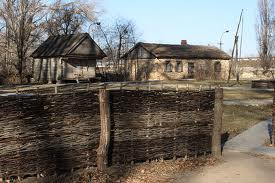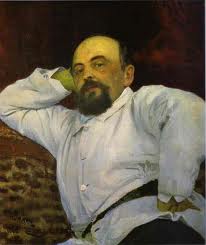I’ve just finished Part Three of Anna Karenina. I’m 372 pages into this 851 paged novel. At times while I was reading, it felt like two pages were being added for every one page I finished, but I’m hanging in there.
Part Three begins and ends with scenes from Levin’s life, and those were great. The middle was about poor Anna and her predicaments. Her controlling husband threatens to take away her son if she doesn’t comply with his wishes, which are to proceed as if nothing has happened. Her lover, Vronsky, is still dashing, but he’s deeply in debt, and that certainly doesn’t bode well for the aristocratic, clandestine couple.
But it was Levin that carried the day for Part Three. He delivers the family tensions that the first sentence of the novel (“Happy families are all alike; every unhappy family is unhappy in its own way”) promised. Tolstoy shows us Levin’s relationships with his two older brothers; there’s antagonism, insensitivity, duty, and a touch of love.
The beginning of Part Three is set in spring. Levin is invigorated by the myriad of farm chores that kick-off the season. It’s a time of intense planning and labor, not visiting and relaxation, so when Levin’s brother Sergey Ivanovich shows up unexpectedly from the city, Levin is forced into a hospitality that he doesn’t entirely feel. Sergey has come to the family’s country estate to rest and indulge himself in idle inactivity. He rises many hours after his brother and seems oblivious to the ways of the land his brother is so doggedly tending.
Sergey enjoys his own long-winded, philosophical theories regarding the local peasantry. Working shoulder to shoulder with these locals, Levin doesn’t understand what his brother is talking about. Although they are not on equal footing, Levin sees them as his neighbors, not some abstract group that is to be studied academically. For Levin, he sees each man as an individual who must be judged on his own merits, not clustered together and generalized about. Ah, but Sergey is a much more skilled debater, so while Levin had felt secure in his position that his neighbors did not need special thought or considerations, he ends up confounded and unsure of what he thinks. The whole exchange reminded me of the skilled pundits of today, everybody from Bill Maher to Jeff Beck, who can argue so passionately and persuasively that my less sophisticated, less knowledgeable, Levin-like head spins.
Part Three concludes on a very different note. The beginning was robust, filled with the activities and promise of spring. The ending has the unexpected arrival of Levin’s other brother, Nikolai, the highly agitated, consumptive, drug and alcohol addicted, dying brother. The wintry pall Nikolai casts over Levin’s home life and livelihood is captured in their spot-on dialog.
Levin is working on writing a book that he believes will revolutionize agricultural productivity. Nikolai, in his ill-health and foul-humor disparages Levin’s ideas, and then goes personal in that biting way families are famous for. Nikolai says to Levin: “You’ve never had, and never have, convictions; all you want is to please your vanity.” Levin does not reply “Look who’s calling the kettle black.” He pathetically replies, “Oh, very well: then let me alone!” So, Nikolai bounces back in the most childish of ways: “And I will let you alone! And it’s high time I did, and go to hell! and I’m very sorry I ever came!”
Can’t you just see it? They’re both furious. Eventually however, Levin tries to sooth his dying brother, but Nikolai will have none of it. Only at the very end does Nikolai say to Levin with a quivering voice, “Anyway, don’t remember evil against me, Kostya!” The sincerity of that moment pushed Levin over the edge and he burst into tears of real sorrow for what was sure to soon be his brother’s demise. Levin becomes so depressed by his brother that he’s nearly suicidal, but it’s the guiding light of his strong work ethic that keeps him afloat.
Now I’m on to Part Four. Will Levin ever get over his wounded pride and re-propose to Kitty? He so desperately wants a wife and family, but his standards are high and ultimately unrealistic. I’m hoping he will humble himself and eventually find happiness. As for Anna, I’m thinking she’s going to suffer mightily for her crime against her marriage. I’m not sure how the peasantry class and infidelity themes will play off of one another, but I suspect they will.
On a personal note, all is well. I did better last Saturday at “Random Acts” then I had on my first try. Again it was a lot of fun, a big crowd filled with fantastic artists. The rain has returned, which is good because I’ve wanted to catch a couple of movies before the Academy Awards next week. I loved The Kings Speech, but I’m rooting for The Fighter. Blood and sweat aside, The Fighter told a terrific story!
Have a great week, and I’ll post again next Friday.


Terry Sue – you are one terrific writer of reviews, or synopses, or summaries, or whatever this is. I am enjoying it and inspired to read some classics. I have many on the shelf waiting. Maybe it will be James Joyce’s “Dubliners,” or Emile Zola’s “Nana.” It will not be an 800 pager. I did read several Laura Ingalls Wilder books the last two weeks, but that was memoir, though so many details were bordering on the unbelievable that I wonder about it; such as getting through the -40 degree winter burning nothing but grass, and subsisting on cornbread and salt pork for a couple of years, with no mention of scurvy.
Have another good week.
Rita
I’m so glad you’re enjoying these…yeah, I don’t know what to call them either. I guess I think of them as observations.
I think you have a valid point about the LIW memoirs, but they sound like they’ve been page-turners, and that’s cool.
Thinking of you with a smile on my face